Chronic Care Management (CCM) software is designed to aid the care of patients with chronic diseases. Due to the increasing number of chronic illnesses and growing focus on preventative care, the CCM software market is expected to grow at a CAGR of 10.8% through 2030.
With many CCM companies on the market, choosing CCM software for a particular organization can be difficult because of the diverse needs within the healthcare sector. Factors that could make your choice challenging include various available features, cost, and interoperability concerns. In this article, we overview seven chronic care management software companies to help you make an informed choice.
7 Best CCM software companies
1. Epic Systems (Epic EMR Software)
Epic Systems is a market leader in healthcare IT solutions. More than 250 national healthcare organizations in the United States use EPIC as their primary software.
The thing that is special about Epic is that it provides an extensive suite of integrated applications for medical charting, decision support, patient engagement, practice management, and more. Epic is also great at interoperability – it facilitates data exchange with other EHR systems.
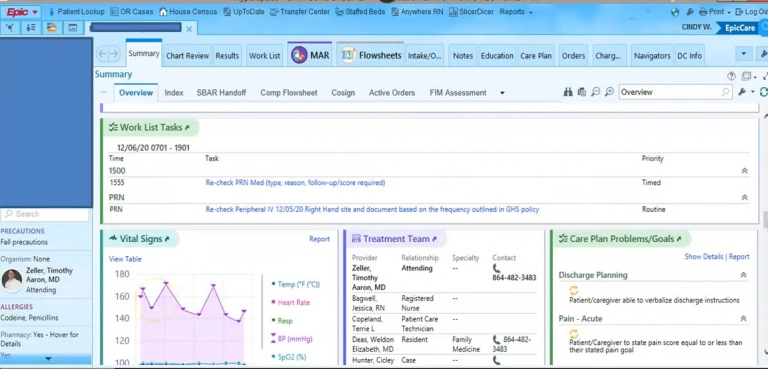
Epic EMR is scalable for large operations and has extremely robust reporting and data analytics tools. Moreover, the system integrates with its patient portal MyChart. The user base is yet another plus – Epic's large user base means a large community of users to learn from, and many third-party consultants are available to help with implementation and optimization.
With all of its benefits, Epic chronic care management platform is more expensive than other software for chronic care management. Epic features are quite complex, which can make it a challenging system to learn. What is more, some users have reported that Epic's system can be inflexible or difficult to customize to their specific needs.
Despite all of these, Epic is still considered one of the best chronic care management software out there. Whether to choose Epic depends on how the combination of pros and cons works for your healthcare organization.
2. TimeDoc Health
TimeDoc Health creates scalable care management solutions for integrated care. Their application also assists in care coordination and helps enhance communication between different care providers, which is crucial for effective chronic care management.
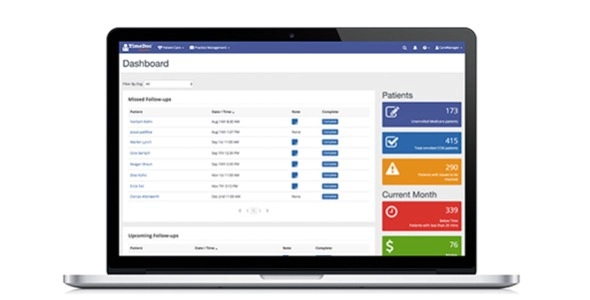
TimeDoc application allows for workflow automation for the healthcare team. The software also supports the tools for enhancing patient engagement. The managers at TimeDoc Health are medically trained, helping to improve healthcare coordination within the organization.
TimeDoc has features that optimize documentation in preparation for Medicare audit. The pre-established healthcare plans and custom templates are also available. Practitioners also report reduced documentation and billing time because the system can generate automated reports.
Seamless integration with EHR systems makes TimeDoc Health one of the market's best chronic care management software companies. In 2021, TimeDoc partnered with Allscripts to allow the integration with Allscripts Professional EHR and PM system (Source ).
Like Epic, Allscripts is a leading provider of healthcare IT solutions in North America. Therefore, the users of their TimeDoc software for chronic care management can benefit from using other tools from the company, such as electronic health records (EHR) and practice management.
3. Chronic Care IQ
Chronic Care IQ is a comprehensive cost management program with a solution that automates chronic care management. It allows healthcare providers to manage patients with chronic conditions more effectively. The system helps staff to connect with patients directly without the involvement of third parties.
The software exclusively focuses on chronic care management. The ChronicCareIQ platform automates much of the chronic care management process, freeing up staff time and increasing efficiency. Moreover, the platform offers risk stratification tools that help providers identify and focus on patients at the highest risk. By assisting providers to comply with the requirements of Medicare's CCM and RPM programs, ChronicCareIQ can help practices generate additional revenue.
ChronicCareIQ is an efficient chronic care management technology focused on improving chronic care through facilitating communication between patients and healthcare providers. However, integrating ChronicCareIQ with existing systems is not one of its strongest suits, and might be a challenge in some cases.
Overall, ChronicCareIQ is an excellent chronic care management service for those seeking software exclusively focused on chronic care. It has a transparent pricing model and is sold at a fixed monthly price.
4. WRS Health (Psychiatry-Cloud and OBGyn Cloud)
WRS Health is a cloud-based healthcare IT company that provides specialty-specific cloud-based electronic health record (EHR) solutions, including Psychiatry-Cloud and OBGyn-Cloud. These technologies deliver solutions for their respective specialties' workflows and needs.
Psychiatry-Cloud is a chronic care management technology for mental health practitioners, including psychiatrists, psychologists, and therapists. The application will also be of use for social workers and counselors. The features available in the application include practice scheduling, billing and reporting, management of medication, and quick charting.
OBGyn-Cloud is a virtual cloud-based platform for ObGyn practices, physicians, and nurses. The features include appointment scheduling, automated calls, and health maintenance alerts. The calendar seamlessly integrates with the billing platform. OBGyn-Cloud allows the integration of all of the administrative and clinical tasks into one process.
All in all, Psychiatry-Cloud and OBGyn Cloud by WRS Health are great for specialty practices and individual physicians. It is not helpful for general practices as the options for care coordination are limited. Both of these applications have interoperability and customization limitations. However, if you are looking for an isolated specialty practice solution, Psychiatry-Cloud and OBGyn Cloud will deliver great results.
5. ThoroughCare
ThoroughCare is a chronic care management company that provides a unified software solution for CCM.
One of the benefits of ThoroughCare is that all tools are collected in one application, and there is no need for multiple chronic care management apps. The ThoroughCare application is currently used by over 600 healthcare providers.
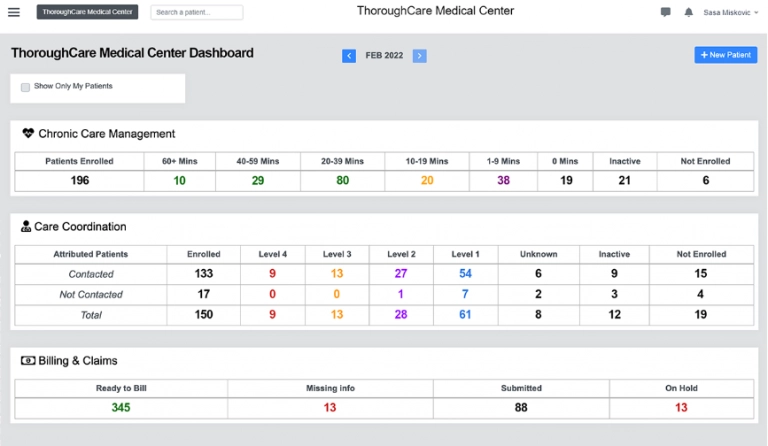
The application's reported positives are its intuitive, user-friendly design, customizable patient-centered care plans, and adequate pricing. The chronic care management software helps automate medical billing and reporting, making it easier for providers to get reimbursed for their care management services.
Some of the potential cons include a lack of advanced or specific features found in other, more specialized systems. Overall, ThoroughCare is a no-hassle, easy-to-use tool with the potential for smooth EHR integration.
6. WellSky
WellSky is a chronic care management company that offers a variety of healthcare solutions, including software for home health, hospice, long-term care, and rehabilitation. It is one of the CCM companies that focuses on the health management of the elderly population and hospice care.
The company has several interconnected applications, including:
- WellSky Care Coordination is a care coordination platform for coordination between personal care agencies and home health/ hospice agencies.
- WellSky Home Health is a home health platform for patients.
- WellSky Personal Care is a facilitated platform for personal health agencies.
- WellSky Hospice and Palliative is a hospice software.
- WellSky CareInsights is a platform for managing patient populations.
The benefits of WellSky include a large industry span, data-driven insights, and interoperability. WellSky's extensive coverage of different healthcare sectors means it likely has a solution tailored for many organizations. It offers solutions for home health, hospice, blood banks, rehabilitation, and clinics. WellSky's chronic care management technology leverages data analytics to provide actionable insights to enhance care delivery.
Despite all the benefits, some users may find using multiple apps simultaneously challenging. For many patients and healthcare practitioners, using one app for all tasks is more convenient. Some users also report the high cost of WellSky compared to similar services. Nevertheless, WellSky is excellent for integration with hospice and palliative care.
7. RXNT
RXNT is a healthcare software company that provides a suite of cloud-based solutions, including Electronic Health Records (EHR), Practice Management (PM), and Medical billing software.
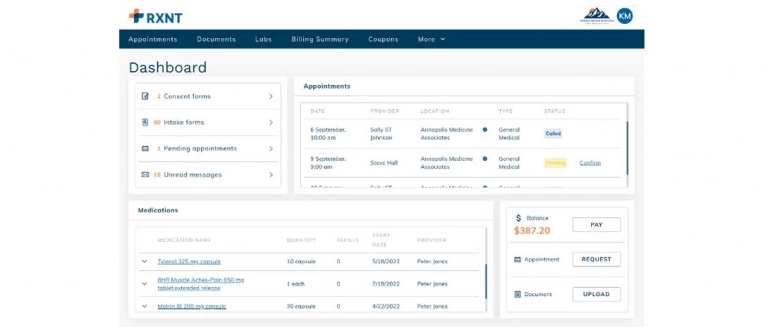
The company's integrated solutions can be purchased together or individually. While it is more complicated than using one app, it offers flexibility to healthcare practices, allowing them to tailor the platform to their needs.
The benefits of RXNT as software for chronic care management are that it is cost-effective with transparent pricing and has a user-friendly interface. The app is also noted for great customer service and features, including e-prescribing, scheduling, charting, billing, and reporting.
However, although RXNT includes reporting tools, some users have found them lacking depth and flexibility compared to other systems. Nevertheless, RXNT is one of the best chronic care management vendors based on price and quality.
CCM software comparison
While we highlighted pros and cons of various chronic care management software companies above, here is the table comparing Epic Systems (Epic EMR Software), TimeDoc Health, Chronic Care IQ, WRS Health (Psychiatry-Cloud and OBGyn Cloud), ThoroughCare, WellSky, and RXNT according to various parameters.
The table below is meant to make your choice more convenient.
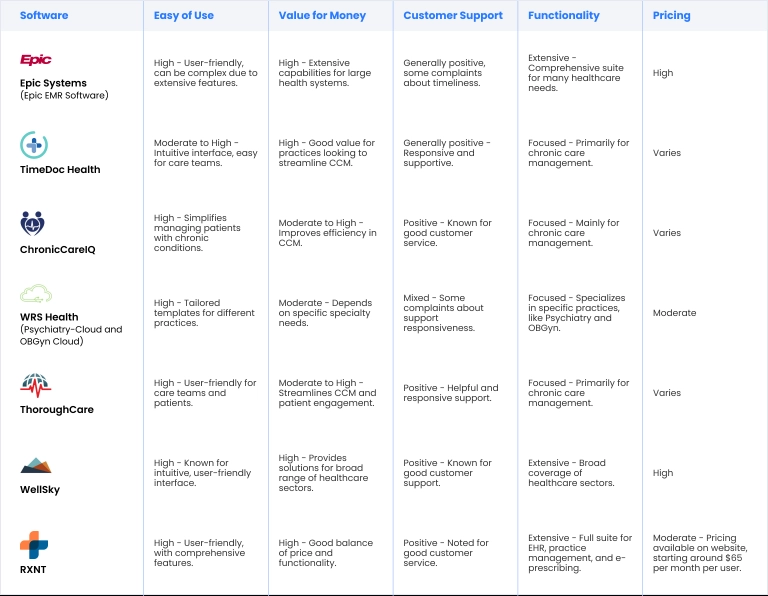
What regulations apply to CCM solutions?
Learn about best practices of FHIR and HIPAA implementation.

How to pick the right CCM software
Choosing the right chronic care management software for your practice is not straightforward. However, it is pretty manageable once you get your priorities straight. Here are several factors to consider:
- Specifications of your healthcare organization: Consider whether your practice is general or specialized, particular chronic conditions you are focused on, the size of population, the goal of the software, and the tools you already use.
- Features: Decide on the features the software is supposed to have. This could include patient monitoring, patient communication tools, EHR, billing and reporting, etc. Consider whether you want these features in a single app or multiple applications.
- Interoperability: Consider integrating new CCM and existing software in your organization.
- Choose user-friendly software: Software with intuitive design is easier for patients and health practitioners online. User-friendly software is the way to engage patients and reduce errors. It is also faster and cheaper to train staff with such software.
- Consider scalable platforms: Choose software that can scale with your organization as it grows. It should be able to handle an increasing number of patients and more complex workflows in the future.
- Cost: When you are done prioritizing features, choose a price range that works for your organization with maximum benefit.
At Binariks, we can help you make a choice between chronic care management vendors. We can provide expert analysis of software, assist you with software integration, data security, and interoperability maintenance.
Final thoughts
While navigating the vast network of chronic care management companies may be difficult, making a strategic choice for your organization is very much possible. The rise of CCM software signifies a shift in thinking towards patient-focused comprehensive care that is crucial in the world with the growing prevalence of chronic conditions.
With our eyes set on the future, we expect CCM apps to enhance their interoperability, patient engagement, and data analytics even further.
FAQ
Share

